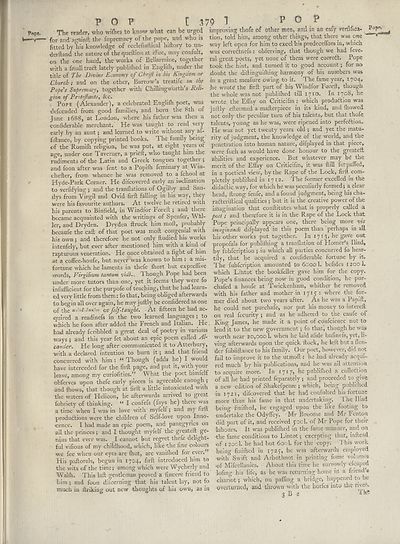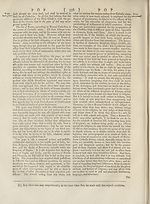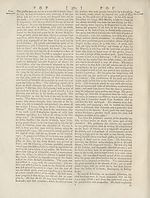Encyclopaedia Britannica > Volume 15, PLA-RAM
(423) Page 379
Download files
Complete book:
Individual page:
Thumbnail gallery: Grid view | List view

POP [3
Pftpe. The reader, who wishes to know what can be urged
—~y—~- for and againft the fupremaey of the pope, and who is
fitted by his knowledge of ecclefialtiea! hiftory to un-
derftand the nature of the queftion at iffue, may confult,
on the one hand, the works of Bellarmine, together
with a fmall tract lately publiihed in Engliih, under the
title of The Divine Economy of Chrifi in his K ingdom or
Church ; and on the other, Barrow’s treatife on the
Pope's Supremacy, together with Chillingworth’s Reli¬
gion of Protefants, See,
Pope (Alexander), a celebrated Englifh poet, was
defeended from good families, and born the 8th of
June 1688, at London, where his father was then a
coniiderable merchant. He was taught to read very
early by an aunt; and learned to write without any af-
fiftance, by copying printed books, 1 he family being
of the Romifh religion, he was put, at eight years of
age, under one Taverner, a prieft, who taught him the
rudiments of the Latin and Greek tongues together ;
and foon after was fent to a Popifh feminary at Win-
chefter, from whence he was removed to a fchool at
Hyde-Park Corner. He difeovered early an inclination
to verfifying ; and the tranflations of Ogilby and San-
dys from Virgil and Ovid firft falling in his way, they
were his favourite authors. At twelve he retired with
his parents to Bintield, in WHdior horeil ; and theie
became acquainted with the writings of Spenfer, Wal¬
ler, and Dryden. Dry den ftruck him moil, probably
becaufe the call of that poet was moil congenial with
his own ; and therefore he not only ftudied his works
intenfely, but ever after mentioned him with a kind of
rapturous veneration. He once obtained a fight of him
at a coffee-houfe, but never was known to him : a mis¬
fortune which he laments in thefe fhort but exprefiive
words, Pirgilium tantum vicli.* I hough Pope had been
under more tutors than one, yet it feems they were fo
infufficient for the purpofe of teaching, that he had learn¬
ed very little from them: fo that, being obliged afterwards
to begin all over again, he may jultly be confidered as one
of the a-jhSJayCloi or felf-taiight. At fifteen he had ac¬
quired a readmefs in the two learned languages ; to
which he foon after added the French and Italian. He
had already fcribbled a great deal of poetry in various
ways ; and this year fet about an epic poem called Ac
cander. He long after communicated it to Atterbury,
with a declared intention to burn it ; and that friend
concurred with him : “ Though (adds he) I would
have interceded for the firft page, and put it, with your
leave, among my curiofities.” What the poet himfelf
obferves upon thefe early pieces is agreeable enough ;
and {hows, that though at firft a little intoxicated with
the waters of Helicon, he afterwards ailived to great
fobriety of thinking. “ I confefs (fays he) there was
a time when I was in love with myfelf ; and my frit
productions were the children of belf-love upon Inno¬
cence. I had made an epic poem, and panegyrics on
all the princes; and I thought myfelf the greateft ge¬
nius that ever was. I cannot but regret thefe delight¬
ful vifions of my childhood, which, like the fine colours
we fee when our eyes are (hut, are vanifhed for ever.”
His paftorals, begun in 1704, firft introduced him to
the wits of the time; among which were Wycherly and
Walfh. This laft gentleman proved a iincere friend to
him ; and foon diicerning that his talent lay, not fo
much in itriking out new thoughts of his own, as in
79 1 pot*
improving thofe of other men, and in an eafy verfifica- ^
tion, told him, among other things, that there wag one
way left open for him to excel his predeceiTors in, which
was correctnefs : obferving, that though we had feve-
ral great poets, yet none of them were corredL Pope
took the hint, and turned it to good account; for no
doubt the diftinguifhing harmony of his numbers was
in a great meafure owing to it. The fame year, I7°4>
he wrote the firft part of his Windfor Foreft, though
the whole was not publifhed till 1710. In 1708, he
wrote the Efiay on Criticifm : which produdtion was
juftly efteemed a mafterpiece in its kind, and {bowed
not only the peculiar turn of his talents, but that thofe
talents, young as he was, were ripened into perfeftion.
He was not yet twenty years old ; and yet the matu¬
rity of judgment, the knowledge of the world, and the
penetration into human nature, difplayed in that piece,
were fucli as would have done honour to the greateft
abilities and experience. But whatever may Ife the
merit of the Eftay on Criticifm, it was ftill fu; puffed,
in a poetical view, by the Rape of the Lock, firft com¬
pletely publifiied in 1712. The former excelled in the
didactic way, for which he was peculiarly formed; a clear
head, ftrong fenfe, and a found judgment, being his cha-
rafteriftical qualities ; but it is the creative power of the
imagination that conftitutes what is properly called a
poet; and therefore it is in the Rape of the Lock that
Pope principally appears one, there being more vis
imagine!ndi difplayed in this poem than perhaps in all
his other works put together. In 1713, he gave out
propofals for publilhing a tranflation of Homer’s Iliad,
by fubfeription ; in which all parties concurred fo hear-
tilv, that he acquired a confiderable fortune by it.
The fubfeription amounted to 62001. befides 1200I.
which Lintot the bookfeller gave him for the copy.
Pope’s finances being now in good condition, he pur-
chafed a houfe at Twickenham, whither he removed
with his father and mother in 17x5: where the for¬
mer died about two years after. As he was a Papift,
he could not purchafe, nor put his money to intereft
on real fecurity ; and as he adhered to the caufe of
King James, he made it a point of confcience not to
lend it to the new government ; fo that, though he was
worth near 20,0001. when he laid afide bufmefs, yet, li¬
ving afterwards upon the quick ftock, he left but a {len¬
der fubfiftance to his family. Our poet, however, did not
fail to improve it to the utmoft: he had already acqui¬
red much by his publications, and he was all attention
to acquire more. In 1717, he publifned a colleftion
of all he had printed feparately ; and proceeded to give
a new edition of Shakefpeare ; which, beuig publifhed
in 1721, difeovered that he had confulted his fortune
more than his fame in that undertaking. I he Iliad
being finifhed, he engaged upon the like footing to
undertake the Odyfley. Mr Broome and Mr Fenton
did part of it, and received 500!. of Mr Pope for their
labours. It was publifiied in the fame manner, and on
the fame conditions to Lintot; excepting that, inftead,
of 120c 1. he had but 600I. for the copy. I his work
being finifhed in 1725, he was afterwards employed
with Swift and Arbuthnot in printing fome volumes
of Mifcellanies. About this time he narrowly efcaped
lofing his life, as he was returning home ill a friend s
chariot ; which, on palling a bridge, happened to be
overturned, and thrown with the horfes into the river.
3 B 2 ™
Pftpe. The reader, who wishes to know what can be urged
—~y—~- for and againft the fupremaey of the pope, and who is
fitted by his knowledge of ecclefialtiea! hiftory to un-
derftand the nature of the queftion at iffue, may confult,
on the one hand, the works of Bellarmine, together
with a fmall tract lately publiihed in Engliih, under the
title of The Divine Economy of Chrifi in his K ingdom or
Church ; and on the other, Barrow’s treatife on the
Pope's Supremacy, together with Chillingworth’s Reli¬
gion of Protefants, See,
Pope (Alexander), a celebrated Englifh poet, was
defeended from good families, and born the 8th of
June 1688, at London, where his father was then a
coniiderable merchant. He was taught to read very
early by an aunt; and learned to write without any af-
fiftance, by copying printed books, 1 he family being
of the Romifh religion, he was put, at eight years of
age, under one Taverner, a prieft, who taught him the
rudiments of the Latin and Greek tongues together ;
and foon after was fent to a Popifh feminary at Win-
chefter, from whence he was removed to a fchool at
Hyde-Park Corner. He difeovered early an inclination
to verfifying ; and the tranflations of Ogilby and San-
dys from Virgil and Ovid firft falling in his way, they
were his favourite authors. At twelve he retired with
his parents to Bintield, in WHdior horeil ; and theie
became acquainted with the writings of Spenfer, Wal¬
ler, and Dryden. Dry den ftruck him moil, probably
becaufe the call of that poet was moil congenial with
his own ; and therefore he not only ftudied his works
intenfely, but ever after mentioned him with a kind of
rapturous veneration. He once obtained a fight of him
at a coffee-houfe, but never was known to him : a mis¬
fortune which he laments in thefe fhort but exprefiive
words, Pirgilium tantum vicli.* I hough Pope had been
under more tutors than one, yet it feems they were fo
infufficient for the purpofe of teaching, that he had learn¬
ed very little from them: fo that, being obliged afterwards
to begin all over again, he may jultly be confidered as one
of the a-jhSJayCloi or felf-taiight. At fifteen he had ac¬
quired a readmefs in the two learned languages ; to
which he foon after added the French and Italian. He
had already fcribbled a great deal of poetry in various
ways ; and this year fet about an epic poem called Ac
cander. He long after communicated it to Atterbury,
with a declared intention to burn it ; and that friend
concurred with him : “ Though (adds he) I would
have interceded for the firft page, and put it, with your
leave, among my curiofities.” What the poet himfelf
obferves upon thefe early pieces is agreeable enough ;
and {hows, that though at firft a little intoxicated with
the waters of Helicon, he afterwards ailived to great
fobriety of thinking. “ I confefs (fays he) there was
a time when I was in love with myfelf ; and my frit
productions were the children of belf-love upon Inno¬
cence. I had made an epic poem, and panegyrics on
all the princes; and I thought myfelf the greateft ge¬
nius that ever was. I cannot but regret thefe delight¬
ful vifions of my childhood, which, like the fine colours
we fee when our eyes are (hut, are vanifhed for ever.”
His paftorals, begun in 1704, firft introduced him to
the wits of the time; among which were Wycherly and
Walfh. This laft gentleman proved a iincere friend to
him ; and foon diicerning that his talent lay, not fo
much in itriking out new thoughts of his own, as in
79 1 pot*
improving thofe of other men, and in an eafy verfifica- ^
tion, told him, among other things, that there wag one
way left open for him to excel his predeceiTors in, which
was correctnefs : obferving, that though we had feve-
ral great poets, yet none of them were corredL Pope
took the hint, and turned it to good account; for no
doubt the diftinguifhing harmony of his numbers was
in a great meafure owing to it. The fame year, I7°4>
he wrote the firft part of his Windfor Foreft, though
the whole was not publifhed till 1710. In 1708, he
wrote the Efiay on Criticifm : which produdtion was
juftly efteemed a mafterpiece in its kind, and {bowed
not only the peculiar turn of his talents, but that thofe
talents, young as he was, were ripened into perfeftion.
He was not yet twenty years old ; and yet the matu¬
rity of judgment, the knowledge of the world, and the
penetration into human nature, difplayed in that piece,
were fucli as would have done honour to the greateft
abilities and experience. But whatever may Ife the
merit of the Eftay on Criticifm, it was ftill fu; puffed,
in a poetical view, by the Rape of the Lock, firft com¬
pletely publifiied in 1712. The former excelled in the
didactic way, for which he was peculiarly formed; a clear
head, ftrong fenfe, and a found judgment, being his cha-
rafteriftical qualities ; but it is the creative power of the
imagination that conftitutes what is properly called a
poet; and therefore it is in the Rape of the Lock that
Pope principally appears one, there being more vis
imagine!ndi difplayed in this poem than perhaps in all
his other works put together. In 1713, he gave out
propofals for publilhing a tranflation of Homer’s Iliad,
by fubfeription ; in which all parties concurred fo hear-
tilv, that he acquired a confiderable fortune by it.
The fubfeription amounted to 62001. befides 1200I.
which Lintot the bookfeller gave him for the copy.
Pope’s finances being now in good condition, he pur-
chafed a houfe at Twickenham, whither he removed
with his father and mother in 17x5: where the for¬
mer died about two years after. As he was a Papift,
he could not purchafe, nor put his money to intereft
on real fecurity ; and as he adhered to the caufe of
King James, he made it a point of confcience not to
lend it to the new government ; fo that, though he was
worth near 20,0001. when he laid afide bufmefs, yet, li¬
ving afterwards upon the quick ftock, he left but a {len¬
der fubfiftance to his family. Our poet, however, did not
fail to improve it to the utmoft: he had already acqui¬
red much by his publications, and he was all attention
to acquire more. In 1717, he publifned a colleftion
of all he had printed feparately ; and proceeded to give
a new edition of Shakefpeare ; which, beuig publifhed
in 1721, difeovered that he had confulted his fortune
more than his fame in that undertaking. I he Iliad
being finifhed, he engaged upon the like footing to
undertake the Odyfley. Mr Broome and Mr Fenton
did part of it, and received 500!. of Mr Pope for their
labours. It was publifiied in the fame manner, and on
the fame conditions to Lintot; excepting that, inftead,
of 120c 1. he had but 600I. for the copy. I his work
being finifhed in 1725, he was afterwards employed
with Swift and Arbuthnot in printing fome volumes
of Mifcellanies. About this time he narrowly efcaped
lofing his life, as he was returning home ill a friend s
chariot ; which, on palling a bridge, happened to be
overturned, and thrown with the horfes into the river.
3 B 2 ™
Set display mode to:
![]() Universal Viewer |
Universal Viewer | ![]() Mirador |
Large image | Transcription
Mirador |
Large image | Transcription
Images and transcriptions on this page, including medium image downloads, may be used under the Creative Commons Attribution 4.0 International Licence unless otherwise stated. ![]()
| Encyclopaedia Britannica > Encyclopaedia Britannica > Volume 15, PLA-RAM > (423) Page 379 |
|---|
| Permanent URL | https://digital.nls.uk/191906275 |
|---|
| Attribution and copyright: |
|
|---|
| Description | Ten editions of 'Encyclopaedia Britannica', issued from 1768-1903, in 231 volumes. Originally issued in 100 weekly parts (3 volumes) between 1768 and 1771 by publishers: Colin Macfarquhar and Andrew Bell (Edinburgh); editor: William Smellie: engraver: Andrew Bell. Expanded editions in the 19th century featured more volumes and contributions from leading experts in their fields. Managed and published in Edinburgh up to the 9th edition (25 volumes, from 1875-1889); the 10th edition (1902-1903) re-issued the 9th edition, with 11 supplementary volumes. |
|---|---|
| Additional NLS resources: |
|

